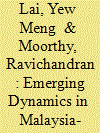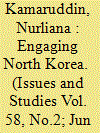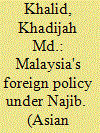|
|
|
Sort Order |
|
|
|
Items / Page
|
|
|
|
|
|
|
| Srl | Item |
| 1 |
ID:
119052


|
|
|
|
|
| Publication |
2013.
|
| Summary/Abstract |
This article discusses the role played by neo-conservative intellectuals during the tenure of Malaysia's fifth prime minister, Abdullah Ahmad Badawi (2003-2009). Abdullah's leadership was distinguished by two qualities which arguably qualify it as "neo-conservative," in terms of revival of policies from a bygone era and the launching of political reforms within the framework of a conservative regime led by the ruling United Malays National Organization (UMNO) party. Using the theoretical experiences of dominant conservative regimes in the Soviet Union, Japan, China and Taiwan, the present authors are of the view that the policies and approach undertaken by Abdullah constitute a sharp departure from those of his predecessor, Mahathir Mohamad, for twenty-two years (1981-2003). Particularly eliciting controversy was the trust Abdullah put into a team of young advisors led by his son-in-law, Khairy Jamaluddin. In this article, we look at how these young neo-conservative intellectuals, together with several identifiable individuals, brought about reforms in Abdullah's leadership and
impacted UMNO politics.
|
|
|
|
|
|
|
|
|
|
|
|
|
|
|
|
| 2 |
ID:
185901


|
|
|
|
|
| Summary/Abstract |
Japan and Malaysia established relations in 1957, the year Malaysia obtained independence from the British. Malaysia has largely benefited through many Japanese assistance programs, and in return, the country has remained one of Japan’s closest friends in Southeast Asia. During his first premiership, Mahathir introduced the Look East Policy (LEP) as a major foreign policy re-direction, moving away from the Western approach adopted by his predecessors. Nevertheless, bilateral relations plateaued during the reign of the two successive prime ministers Abdullah Badawi and Najib Razak primarily as a result of the changing regional geopolitical landscape. Malaysia moved closer towards an emerging China. However, the May 2018 general election paved the way for Mahathir to resume control of the country for the second time after a lapse of 15 years. Within less than a year, Japan started to bounce back in Malaysia’s political and strategic sensors. Japan is set to play a greater role in the Malaysian economic landscape, especially with its assistance of low-interest samurai bonds to aid the debt-stricken new Malaysian government. For Japan, this rekindling of old friendship could not have been more timely and may translate into greater support to Japan’s initiatives for regional peace and for a free and open Indo-Pacific region. This paper examines the evolving trends in bilateral relations between Japan and Malaysia in the second Mahathir administration. More specifically, it explicates the external and domestic sources which have affected and recalibrated Malaysia’s Japan policy in the context of a shifting regional strategic milieu as well as an evolving post-election domestic political landscape. This paper contends that the emerging dynamics and trajectories in Malaysia’s relations with Japan under the nascent “Mahathirism 2.0” period have been primarily shaped by the country’s ruling elite’s perceptions of her external conditions in the context of East Asia’s changing power dynamics, tempered by their domestic political considerations and leadership traits/idiosyncrasies. It further argues that despite the newly-minted Pakatan Harapan (PH) government’s visible foreign policy adjustments indicating a possible shift of emphasis from China towards Japan, such recalibrations are yet to alter the fundamentals of Malaysia’s Northeast Asia policy generally and its Japan policy specifically, an area in which the effects of structural conditions (proximity, power asymmetry, rivalries and uncertainties) continue to be informed by the Malaysian ruling elite’s domestic political considerations as they strive as much to optimize the country’s external interests as to consolidate their domestic legitimation.
|
|
|
|
|
|
|
|
|
|
|
|
|
|
|
|
| 3 |
ID:
185902


|
|
|
|
|
| Summary/Abstract |
The assassination of Kim Jong Nam in 2017 brought about a significant change in the diplomatic relationship between Malaysia and North Korea. Although diplomatic relations between the two countries were downgraded due to the incident, current changes would likely encourage the resumption of diplomatic ties. This study applies a poliheuristic decision-making analysis of Malaysia’s diplomatic relations with North Korea. It argues that Malaysia’s choice to establish diplomatic ties with North Korea was made consistent with the strong sense of neutrality that has shaped Malaysia’s foreign policy. Despite the increased security threat North Korea is perceived as globally, it was not until the assassination attempt that there was any regression in diplomatic relations between the two countries. Poliheuristic theory can also be utilized to explain why Malaysia will most likely proceed with reopening the Malaysian Embassy in Pyongyang as this is an alternative that would present Malaysia with continued gain in consideration of both its emphasis on diplomacy and neutrality in its foreign policy.
|
|
|
|
|
|
|
|
|
|
|
|
|
|
|
|
| 4 |
ID:
172800


|
|
|
|
|
| Summary/Abstract |
While local Marxist and neo-Marxist parties attempted to synchronize their revolutionary struggles with the centers of world communism during the period 1945–1991, political currents on the ground in Malaysia and Singapore were pushing for the establishment of postcolonial authority, social peace, and economic prosperity. The Cold War struggle between 'communism' and 'democratic capitalism' was highly refracted, even distorted, on the ground in these two Southeast Asian countries. This refraction was largely manifested in the struggles by nationalists of all ideological stripes to achieve a multiracial society through interethnic decolonization under the banner of waging 'class warfare' against colonial authority. For many anti-colonial political parties, siding with or joining leftist movements was a façade for revolutionary agendas that were not necessarily Marxist-Leninist in orientation. Secondly, the biographies and civil society narratives of contending political figures of the time suggest that they were less inclined to define their thinking about development along Cold War ideological orthodoxy than to defy the latter to make things work for prosperity. Finally, the successor elites who took the place of the colonial rulers were consistently obsessed with burnishing sovereignty in spite of the international Cold War. This can be seen in their slippery practice of nonalignment in foreign policy. The Malaysian and Singaporean cases strongly present the thesis of indigenization of the Cold War for local purposes.
|
|
|
|
|
|
|
|
|
|
|
|
|
|
|
|
| 5 |
ID:
185900


|
|
|
|
|
| Summary/Abstract |
This paper examines Malaysia’s evolving relations with China during the second Mahathir administration from 2018 to 2020 in political, economic, and security aspects. While much of the foreign media portrayed the unprecedented change of government in May 2018 as an instance of “pushing back” against China, this paper refutes this simplistic view. It argues that while there were uncertainties in bilateral relations in the initial period following the election, the “Mahathir 2.0” administration ultimately renewed and reaffirmed its relationship with China on a positive note. Economically, the Mahathir 2.0 administration sought to renegotiate Malaysia’s economic relationship with China to align it with its political economy agenda. In terms of security, Prime Minister Mahathir had at first sought to form a new normative framework but later came to adopt a more assertive stand in the South China Sea dispute. At the same time, he showed a continued (but cautious) willingness to engage in defense diplomacy and military-to-military relations with China. This paper analyzes these developments in light of the theoretical framework of neoclassical realism which takes into account the systemic, domestic, and personal factors in influencing the country’s foreign policy. It also interprets these developments as exercises in hedging by a small power in an age of increasing uncertainty.
|
|
|
|
|
|
|
|
|
|
|
|
|
|
|
|
| 6 |
ID:
105218


|
|
|
|
|
| Publication |
2011.
|
| Summary/Abstract |
Malaysian foreign policy and diplomacy under Mahathir Mohamad were both grandiose and pragmatic, if not audacious. Faced with a changing and uncertain global environment, current Prime Minister Najib Razak has formulated external strategies expected to sustain Malaysia's economic progress to ensure regime legitimacy and political stability.
|
|
|
|
|
|
|
|
|
|
|
|
|
|
|
|
| 7 |
ID:
164964


|
|
|
|
|
| Summary/Abstract |
In June, Singapore captured the global spotlight when it hosted the summit meeting between US President Donald Trump and North Korean leader Kim Jong-un. The regional political environment prompted anxiety, given the leadership transition in Malaysia. Domestically, political leadership transition and the opposition Workers’ Party’s lawsuit over allegations of mismanagement of town council funds were major issues.
|
|
|
|
|
|
|
|
|
|
|
|
|
|
|
|
|
|
|
|
|